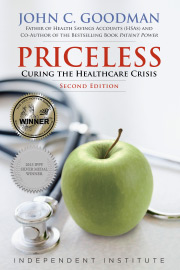This is my third in a series on why we need to hear more from economists and less from non-economists—especially on economic topics.
- Part 1: Socialism
- Part 2: Racism
- Part 3: Taxes
- Part 4: Environment
Joe Biden says that corporations aren’t paying their fair share of taxes. He also says his plan to raise corporate taxes won’t harm anyone who makes less than $400,000 a year.
Virtually all economists know these statements are false.
Yet I don’t think there has ever been a time in recent history when there has been such a large gap between what economists know and what politicians say.
In our legal system, corporations can sign contracts and enter into binding legal agreements. They can sue and be sued. All this is done under the guise of a “legal fiction,” which treats corporations as though they were persons.
However useful this fiction is for our legal system, it doesn’t change a fundamental reality: a corporation is actually a relationship between managers and workers and stockholders and consumers; and that’s just for starters.
Governments can tax relationships. In fact, they often do. But relationships don’t pay taxes.
For example, all but five state governments tax sales. But sales don’t pay taxes. Buyers and sellers do. The federal government taxes wages. But wages don’t pay taxes. Employers and employees do.
Similarly, when the government taxes corporate income the burden of that tax falls on consumers, workers, shareholders, etc.
When I say that all economists know this, there is one notable exception: Paul Krugman. And he has a huge communications platform: the New York Times. More about him below.
To the extent that the corporate income tax is borne by shareholders, the tax falls on everyone who owns stock through an IRA or a 401(k) account. It also affects just about every worker pension plan.
About 34 million people (mainly workers and retirees of very large companies) have a pension that is implicitly insured by the federal government. But that insurance only protects a minimum amount, not the full pension promise. A tax that reduces corporate net earnings reduces pension earnings. In the process millions of moderate-income families are likely to be worse off.
Corporate taxes may also cause worker wages to be lower than otherwise. How could that happen? The U.S. economy competes for capital with other economies all over the world. Our corporate taxes reduce the rate of return on capital in the U.S. and encourage investment elsewhere. Yet investment in tools, machines and equipment, etc., is what allows workers to produce more output and earn higher wages.
There is a great deal of uncertainty about who really bears the burden of corporate taxes. But no study finds that workers get off scot-free.
The Tax Policy Center (a joint venture of the Urban Institute and the Brookings Institution) estimates that 20 percent of the corporate income tax is paid by labor. The Congressional Budget Office (CBO) puts the worker’s burden at 25 percent. Other studies estimate that the number could be as high as 70 percent.
The most sophisticated model of international capital flows ever developed has been produced by Boston University economist Laurence Kotlikoff and his colleagues. That model predicts that corporate taxes are completely paid by labor.
What about personal income taxes? Professor Kotlikoff estimates that for the highest income earners, all the Biden taxes combined will create a lifetime marginal tax rate of 62 percent. Blue-state residents with high state income tax rates could face up to a 70 percent rate.
What’s wrong with that? When highly productive people face very high tax rates, they don’t usually quit working. Instead, they change the type of work they do. They spend less time earning taxable income and more time avoiding taxes. When they are earning taxable income, they are mainly producing goods and services that benefit other people. When they are avoiding taxes, they seek out tax shelters, loopholes and other tax dodges that have no value for anyone else.
At a 70 percent tax rate, for example, taxpayers have an incentive to spend up to 69 cents in socially wasteful ways to avoid a dollar of taxable income.
Economist Lawrence Lindsey has estimated that when the top income tax rate was lowered from 70 to 50 percent, beginning in 1981, the government recouped at least one-sixth and probably one-fourth of the revenue loss because taxable earnings increased. The reason: wealthy people responded by spending less time avoiding taxes and more time earning taxable income. That implies that the social benefits of lower taxes and the social costs of higher taxes are quite large.
This is why economists, with political views from right to left, generally supported the Tax Reform Act of 1986. That was a revenue-neutral reform that eliminated tax shelters and other loopholes while also lowering the top income-tax rate from 50 percent to 28 percent.
You would never know what economists in general think, however, if you only read the columns of New York Times writer Paul Krugman. Although the Times touts him as a Nobel laureate economist, Krugman’s columns for the most part are little more than Democratic Party propaganda. When he does write about economic subjects, his columns rarely reflect mainstream economics.
Like Joe Biden, Krugman tells us that corporations pay taxes—just like people do. And corporate taxation is a free lunch—there are no bad consequences (like lower wages for workers).
Krugman praises the 90 percent personal income tax rates of the 1950s, although because of tax shelters and other dodges almost no one ever paid those rates. He thinks that LeBron James should pay as much as 90 percent of his earnings to the government—leaving him with a much smaller share of what he produces than what the slaves got to keep on cotton plantations in the antebellum South.
There is nothing wrong with having kooky beliefs. There is something wrong with encouraging readers to reject real economics in favor of snake oil.
Meanwhile, mainstream economists have been largely AWOL. They have done a poor job of explaining why corporate taxes matter and why high personal tax rates have large social costs.












